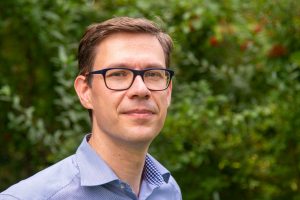
Prof. Frank Ortmann
“And what do you do for a living?” – To some people, this classic small talk question poses a real challenge. For example, what should a professor for “Theoretical Methods of Spectroscopy” reply? Frank Ortmann has several possible answers ready, depending on how deep the interest is. “My simplest answer is: I sit at the computer and simulate processes in the field of nanoscience, for example for materials for photovoltaics. With the help of these simulations, we explore the fundamentals,” the scientist explains. “Our basic findings may not immediately increase solar cell efficiency by 1 % in one day,” he adds with a wink, “but they might enable an improvement of 2 % in one year.”
The 39-year-old scientist moved from TU Dresden to the Department of Chemistry at TU München in June 2020 and has been a member of e-conversion since then. It was not an easy start in the middle of the corona pandemic: finding accommodation, setting up a new team, getting to know colleagues – everything turned out to be complicated. On top of that, a serious problem shook his research community. In May, hackers had attacked and partially paralyzed high-performance data centers throughout Europe. These supercomputers are an essential resource for theorists, as only they provide the necessary computational power to perform particularly complex simulations, which often take several days.
Electrons – close bond or loose relationship?
But what exactly is it that Frank Ortmann and his team simulate? One main research topic is the transport of electrical charges in organic semiconductors, which are used for organic solar cells or OLEDs. The scientists investigate, for example, why some semiconductor materials bind the electrons relatively strongly while others conduct them well. Initial results show that the attracting forces acting on the charge carriers depends on how the molecules of the semiconductor material are spatially oriented. They furthermore indicate that even the smallest chemical changes can alter the arrangement of the molecules and thus significantly improve charge transport. Another project is investigating how the introduction of foreign atoms and molecules into the semiconductor, a process known as doping, reduces the resistance at the electrodes or other interfaces. Because this is where a large part of the voltage is usually lost.
In almost all projects, the theorists work closely with experimental partners and often save them unnecessary work. They can, for instance, predict whether a newly created material is suitable for organic solar cells or whether its synthesis might be a loss of time. Conversely, there are also experimental findings that are modeled theoretically and thus understood.
Theoretical Chemistry – a discipline with a promising future
Frank Ortmann developed a preference for theory while he was still a student. His career began with a degree and doctorate in physics at the University of Jena. “My studies of course also involved working in the lab. But to me, it always felt like fishing in muddy waters,” he remembers. “What I like about theoretical work is the systematic approach to getting to the bottom of things. And it gives me the feeling that I can control things.” Early on, Frank Ortmann oriented himself towards theoretical chemistry by focusing on solid-state physics and surface physics. After postdoc positions in Grenoble and Barcelona, he established an Emmy Noether independent junior research group at TU Dresden in 2014 and was group leader at the Dresden Cluster of Excellence for Microelectronics from 2017.
Frank Ortmann is convinced that theoretical chemistry will play a very central role in the future. With increasingly faster computers and less expensive computing time, scientists will be able to further refine their simulation techniques. As a result, theoretical models will increasingly complement or even replace experimental techniques. Whether and how quickly this will happen, however, depends on one decisive factor, explains Frank Ortmann: “The bottleneck are talented PhD students. Working in theory in science is a very focused and special job. Put simply, in addition to the necessary affinity for computers, you have to be comfortable with yourself, a pencil and a piece of paper. But the reward for all the research work is a deeper understanding that only theory can provide.”
Those who feel the need for more practice after completing their doctorate have excellent career prospects outside of research. Former companions of Frank Ortmann today work, for example, as editor at Wiley publishing house, as consultant, patent attorney, at Infineon or have founded their own company. If the mixture of theoretical challenges, topics in the field of energy research and excellent career prospects sounds tempting to you, please contact us! There are still a number of positions available in Frank Ortmann’s group…
(Author: Birgit Ziller)
Contact
Prof. Frank Ortmann
Assistant Professorship of Theoretical Methods in Spectroscopy
Department of Chemistry
Technical University of Munich
Lichtenbergstr. 4/V
85748 Garching b. München
frank.ortmann(at)tum.de
https://www.department.ch.tum.de/tms/
